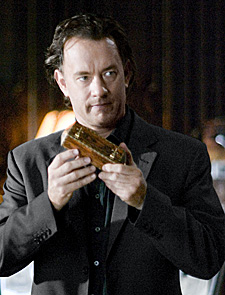Greg Clarke, the author of Is it worth believing? The spiritual challenge of the Da Vinci Code and challengingdavinci.com has produced a briefing for Christians keen to start DVC conversations.
You’ll find the text reproduced in a ready-to-print format in the attached resource box, as well as a new hand-out for thinkers keen to understand the challenge the DVC represents…
It's lavish, it's entertaining, and it wants to rewrite history.
It's also preposterous, enraging and gives Christians their best opportunity in decades to explain why we believe in the ancient faith that Jesus was God in the flesh, come into the world to rescue us from sin.
We'll have a lot of work to do convincing viewers that the film's basic plot-line is made up and can't be historically true. Seeing is believing, and seeing on the big screen can make a speculation seem rock-solid.
There's plenty here to talk about: where the New Testament came from, what we know (and don't know) about Mary Magdalene, the glory and shame of the Church throughout history, and the understanding of man and woman in Christianity.
Sir Ian McKellen (who plays Holy Grail authority, Sir Leigh Teabing) is on record as saying the Bible should carry a disclaimer, warning readers that it is fiction. The religious stakes are high, and those around the film want to have it both ways: they keep saying "it's just a story", but keep suggesting that traditional, biblical Christianity is, too.
 Can Christians convince today's theatre-goers to open up a Bible, perhaps a history textbook, and see for themselves the difference between the film's suggestions and the records we have?
Can Christians convince today's theatre-goers to open up a Bible, perhaps a history textbook, and see for themselves the difference between the film's suggestions and the records we have?
Mystery props up mystery in this film, and viewers who have read the book will certainly have a head start in holding the complex plot together. For those with eyes to see, there are extra treats, such as the one-second cameo, Hitchcock-style, of two writers, Lynn Picknett and Clive Prince, who popularised the view that the Knights Templar were protectors of the Magdalene myth. (Ironically, such bonus moments in films are now given the Christian nickname, "Easter eggs!')
To build your faith on this film would be like trying to balance a glass pyramid on its point. But that is what many people are happy to do, and Christians now have the joyful but difficult task of convincing da Vinci Code fans that faith doesn't have to be that difficult, that
precarious and that improbable.
I am looking forward to the challenge!
Dr Greg Clarke is the director of CASE, the Centre for Apologetic Scholarship and Education. His Ph.D. is in English Literature. He has lectured at University of New South Wales, Macquarie University and Moore Theological College. His main area of research is theology and literature, with special interests in eschatological theory and the use of the Bible in literature. He also teaches postmodernism and apologetics.
Images courtesy Sony Pictures























